4, Experimental conclusion
1. Experimental task 1
-
Task 1-1
-
task1_1.asm source code
assume ds:data, cs:code, ss:stack data segment db 16 dup(0) data ends stack segment db 16 dup(0) stack ends code segment start: mov ax, data mov ds, ax mov ax, stack mov ss, ax mov sp, 16 mov ah, 4ch int 21h code ends end start -
task1_1 screenshot before the end of line17 and line19
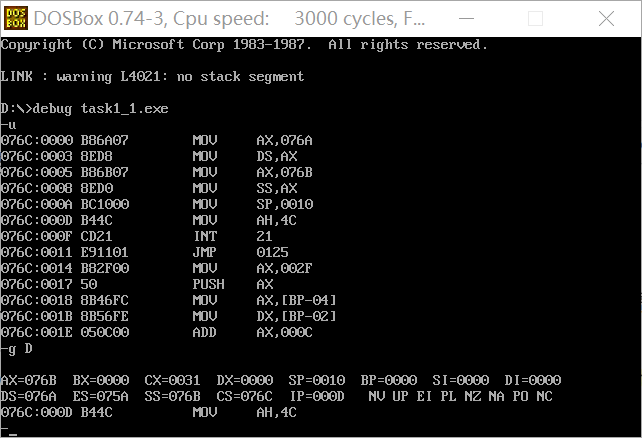
-
Question answer
① In debug, execute until the end of line17 and before line19. Record this time: register (DS) = 076a, register (SS) = 076B, register (CS) = 076C
② Assuming that the segment address of the code segment is X after the program is loaded, the segment address of the data segment is X-2h and the segment address of the stack is X-1h.
-
-
Task 1-2
-
Task task1_2.asm source code
assume ds:data, cs:code, ss:stack data segment db 4 dup(0) data ends stack segment db 8 dup(0) stack ends code segment start: mov ax, data mov ds, ax mov ax, stack mov ss, ax mov sp, 8 mov ah, 4ch int 21h code ends end start -
task1_2. After debugging to the end of line17 and before line19, observe the screenshot of register DS, CS and SS values
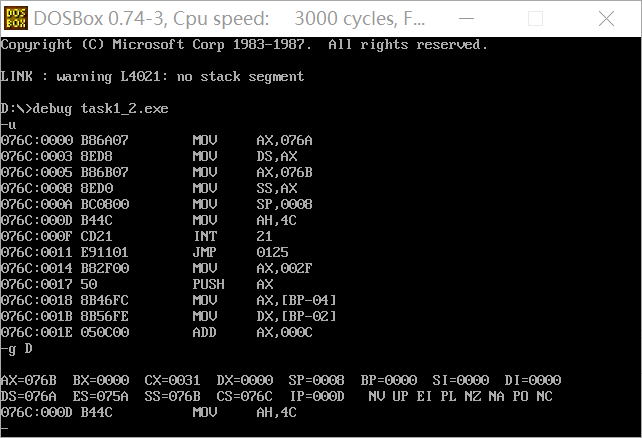
-
Question answer
① In debug, execute until the end of line17 and before line19. Record this time: register (DS) = 076A, register (SS) = 076B, register (CS) = 076C
② Assuming that the segment address of the code segment is X after the program is loaded, the segment address of the data segment is X-2h and the segment address of the stack is X-1h.
-
-
Task 1-3
-
Task task1_3.asm source code
assume ds:data, cs:code, ss:stack data segment db 20 dup(0) data ends stack segment db 20 dup(0) stack ends code segment start: mov ax, data mov ds, ax mov ax, stack mov ss, ax mov sp, 20 mov ah, 4ch int 21h code ends end start -
task1_3. Screenshot of the values of registers DS, CS and SS before the end of debugging to line17 and line19
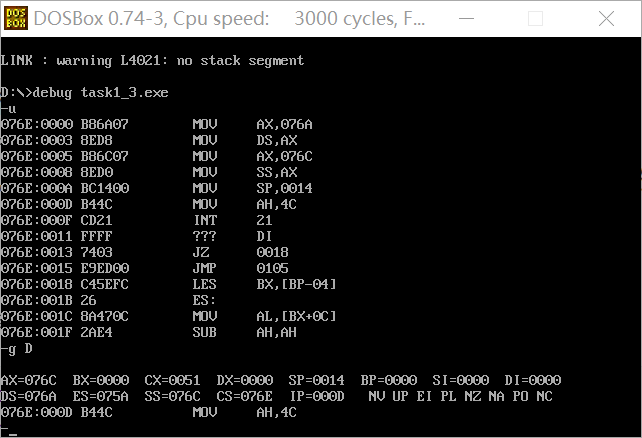
-
Question answer
① In debug, execute until the end of line17 and before line19. Record this time: register (DS) = 076A, register (SS) = 076C, register (CS) = 076E
② Assuming that the segment address of the code segment is X after the program is loaded, the segment address of the data segment is X-4h and the segment address of the stack is X-2h.
-
-
Tasks 1-4
-
Task task1_4.asm source code
assume ds:data, cs:code, ss:stack code segment start: mov ax, data mov ds, ax mov ax, stack mov ss, ax mov sp, 20 mov ah, 4ch int 21h code ends data segment db 20 dup(0) data ends stack segment db 20 dup(0) stack ends end start -
task1_4. After debugging to the end of line17 and before line19, observe the screenshot of register DS, CS and SS values
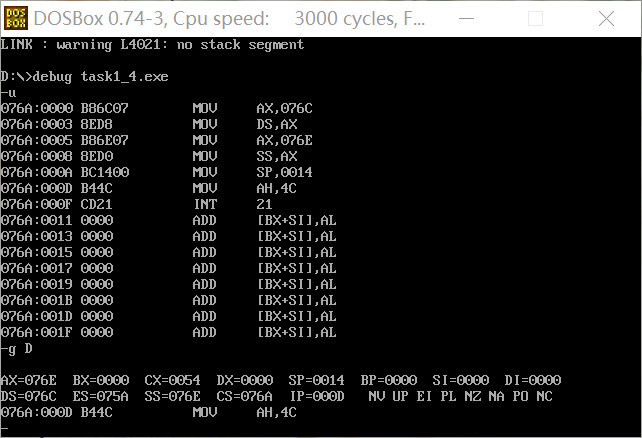
-
Question answer
① In debug, execute until the end of line9 and before line11. Record this time: register (DS) = 076C, register (SS) = 076E, register (CS) = 076A
② Assuming that the segment address of the code segment is X after the program is loaded, the segment address of the data segment is X+2h and the segment address of the stack is X+4h.
-
-
Tasks 1-5
Based on the practice and observation of the above four experimental tasks, summarize and answer:
① For the segment defined below, after the program is loaded, the actual memory space allocated to the segment is 16Byte.xxx segment db N dup(0) xxx ends② If the program Task1_ 1.asm, task1_ 2.asm, task1_ 3.asm, task1_ 4. In ASM, if the pseudo instruction end start is changed to end, which program can still be executed correctly. The reasons are analyzed and explained in combination with the conclusions obtained from practical observation.
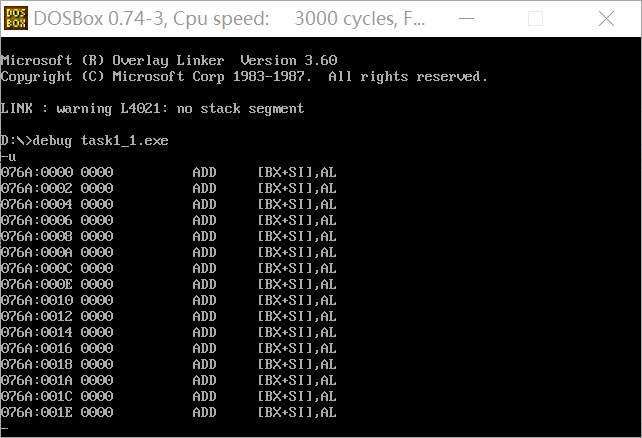
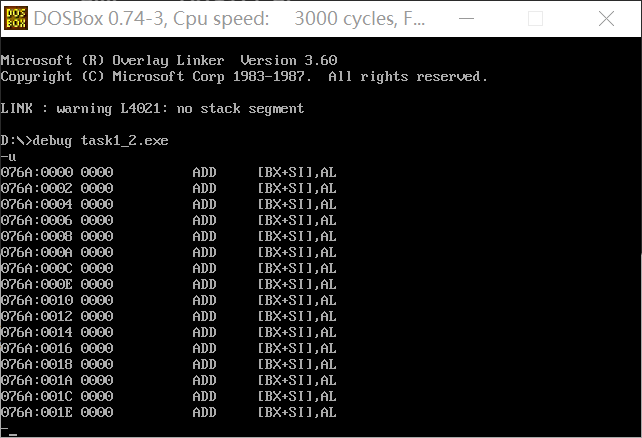
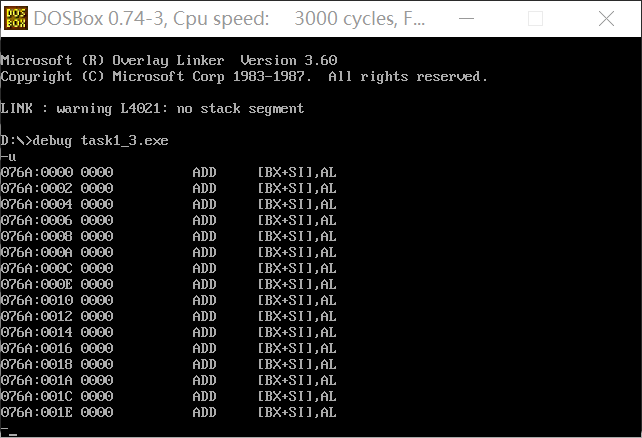
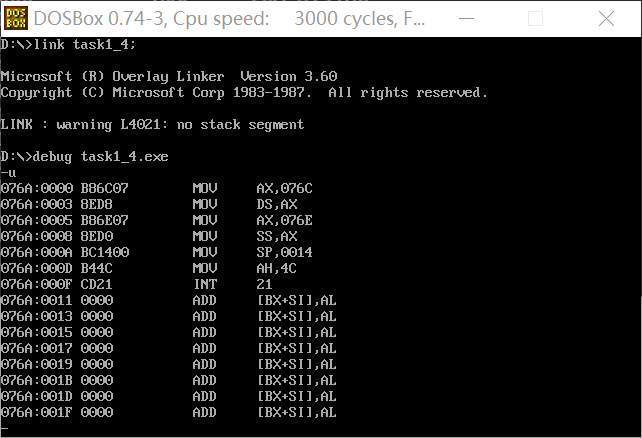
Only task1_4.asm can still operate normally.
reason:
End in addition to informing the compiler of the end of the program, it can also inform the compiler of where the entry of the program is. The pseudo instruction end describes the end of the program and the entry of the program. After compilation and connection, the program entry indicated by "end start" is converted into an entry address and stored in the description information of the executable file.
Without the pseudo instruction, the exe file is loaded into memory. First, point CS:IP to the first address of the program. And only Task1_ In the program of 4, the code segment is defined at the beginning, so CS:IP points to the first address of the instruction. task1_ 1-1_ The data segment is defined at the beginning of the program of 3, so CS:IP points to the first address of the data rather than the instruction, and the CPU will execute the machine instructions in the data segment.
2. Experimental task 2
-
Assembly source code
assume cs:code code segment start: mov ax, 0b800h mov ds, ax mov bx, 0f00h mov cx, 50h mov ax, 0403h s: mov ds:[bx], ax add bx, 2 loop s mov ah, 4ch int 21h code ends end start -
Screenshot of operation results
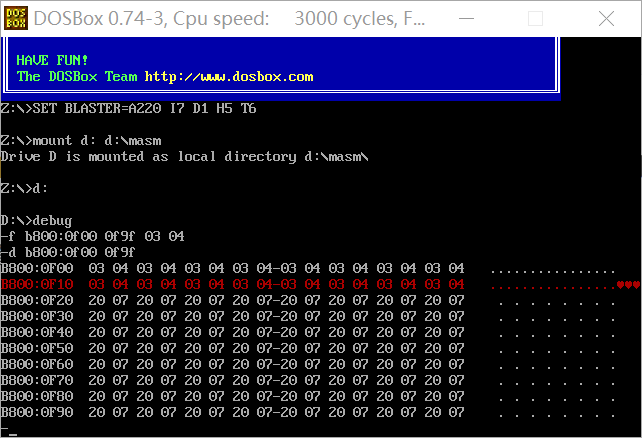
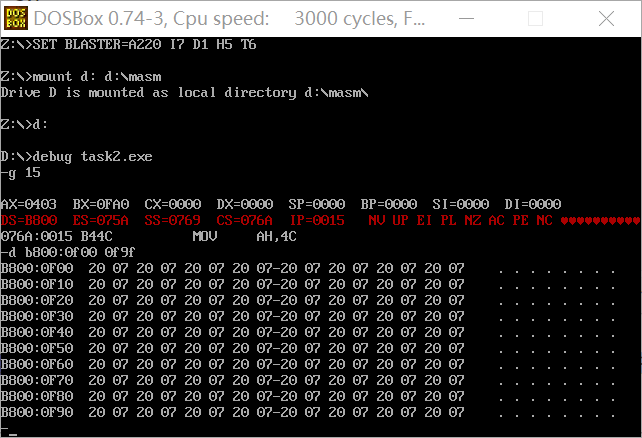
The results are consistent.
3. Experimental task 3
-
Complete assembly source code
assume cs:code data1 segment db 50, 48, 50, 50, 0, 48, 49, 0, 48, 49 ; ten numbers data1 ends data2 segment db 0, 0, 0, 0, 47, 0, 0, 47, 0, 0 ; ten numbers data2 ends data3 segment db 16 dup(0) data3 ends code segment start: mov ax, data1 mov ds, ax mov bx, 0 mov cx, 0ah s: mov ax, ds:[bx] add ax, ds:[bx+10h] mov ds:[bx+20h], ax inc bx loop s mov ah,4ch int 21h code ends end start -
Load, disassemble and debug screenshots in debug
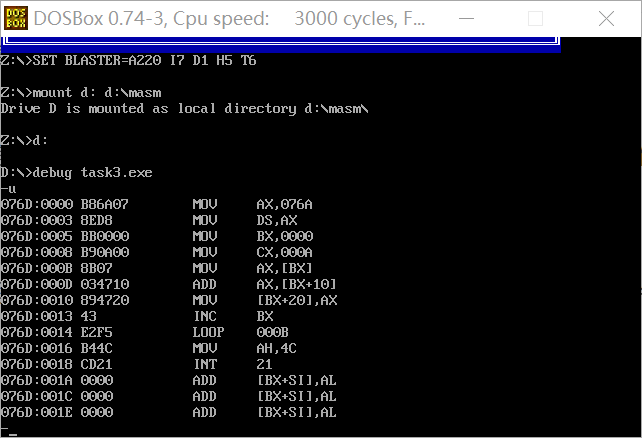
It is required to give the debug command and screenshot to view the original value of memory space data corresponding to logical segments data1, data2 and data3 before adding data items in turn
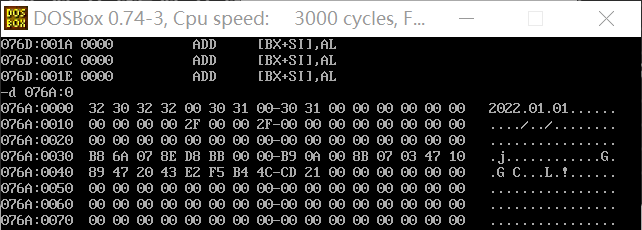
And, after adding in turn, view the debug command and screenshot of the original value of memory space data corresponding to logical segments data1, data2 and data3

4. Experimental task 4
-
Complete assembly source code
assume cs:code data1 segment dw 2, 0, 4, 9, 2, 0, 1, 9 data1 ends data2 segment dw 8 dup(?) data2 ends code segment start: mov ax,data1 mov ds,ax mov ax,data2 mov es,ax mov bx,0 mov si,14 s:mov ax,ds:[bx] mov es:[si],ax add bx,2 sub si,2 loop s mov ah, 4ch int 21h code ends end start -
Load, disassemble and debug screenshots in debug
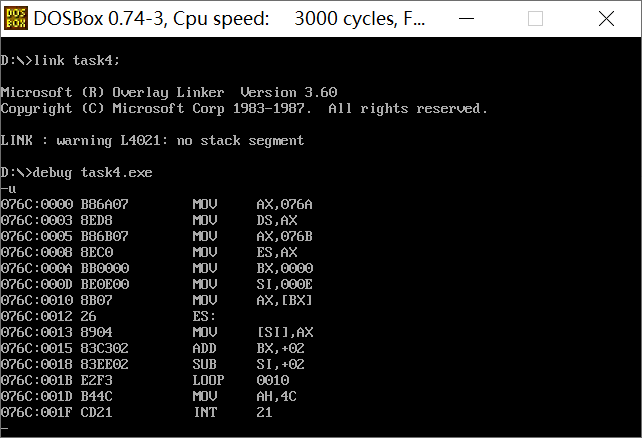
It is required to give a screenshot of the memory space corresponding to data segment data2 by using the d command before the program exits.


5. Experimental task 5
-
task5.asm source code
assume cs:code, ds:data data segment db 'Nuist' db 2, 3, 4, 5, 6 data ends code segment start: mov ax, data mov ds, ax mov ax, 0b800H mov es, ax mov cx, 5 mov si, 0 mov di, 0f00h s: mov al, [si] and al, 0dfh mov es:[di], al mov al, [5+si] mov es:[di+1], al inc si add di, 2 loop s mov ah, 4ch int 21h code ends end start -
Screenshot of operation results
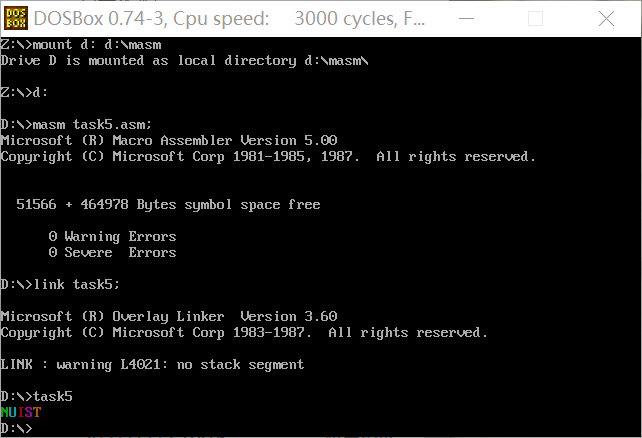
-
Use the debug tool to debug the program, and use the g command to execute the screenshot before the program returns (i.e. after ine25 and before line27)
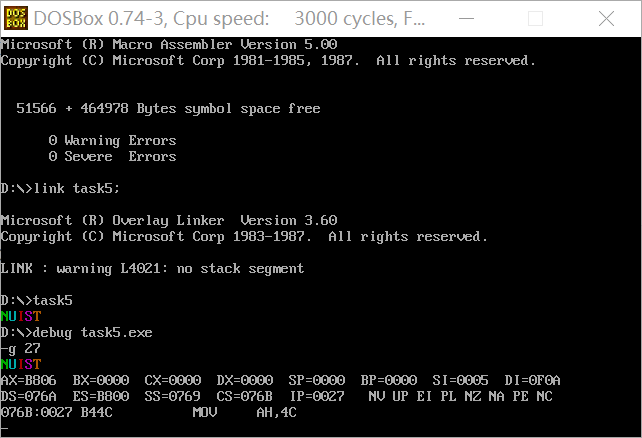
-
What is the function of line19 in the source code?
Convert lowercase letters to uppercase letters
-
xxx segment db N dup(0) xxx ends 1 2 3 what is the purpose of the byte data of data segment line4 in the source code?
8-bit color code
6. Experimental task 6
-
task6.asm source code
assume cs:code, ds:data data segment db 'Pink Floyd ' db 'JOAN Baez ' db 'NEIL Young ' db 'Joan Lennon ' data ends code segment start: mov ax,data mov ds,ax mov bx,0 mov cx,4 mov si,0 s:mov al,ds:[0+si] or al,20H mov ds:[0+si],al add si,16 loop s mov ah, 4ch int 21h code ends end start -
Load, disassemble and debug screenshots in debug
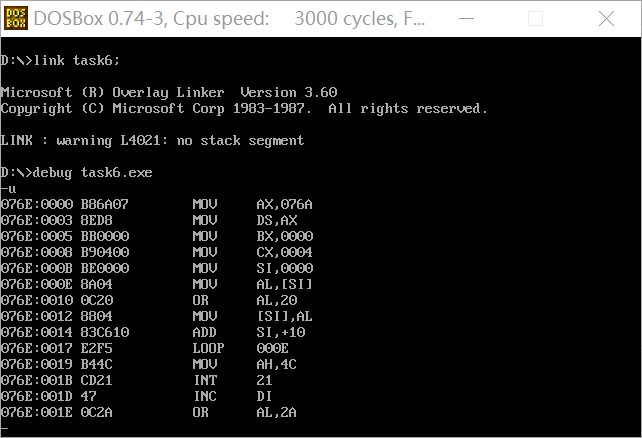
It is required to give a screenshot of the memory space corresponding to the data segment data by using the d command before the program exits.
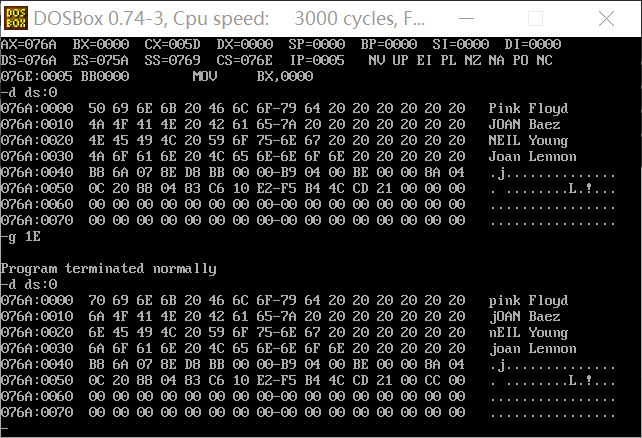
7. Experimental task 7
-
task7.asm source code
assume cs:code, ds:data, es:table data segment db '1975', '1976', '1977', '1978', '1979' dw 16, 22, 382, 1356, 2390 dw 3, 7, 9, 13, 28 data ends table segment db 5 dup( 16 dup(' ') ) ; table ends code segment start: mov ax,data mov ds,ax mov ax,table mov es,ax mov cx,5 mov bx,0 mov si,0 s1:mov ax,ds:[bx] mov es:[si],ax add bx,2 mov ax,ds:[bx] add si,2 mov es:[si],ax add bx,2 add si,14 loop s1 mov bx,20 mov cx,5 mov si,5 s2:mov ax,ds:[bx] mov es:[si],ax add si,2 mov word ptr es:[si],0 add bx,2 add si,14 loop s2 mov bx,30 mov cx,5 mov si,10 s3:mov ax,ds:[bx] mov es:[si],ax add bx,2 add si,16 loop s3 mov bx,20 mov di,30 mov cx,5 mov si,13 s4:mov ax,ds:[bx] mov dl,ds:[di] div dl mov es:[si],al add bx,2 add di,2 add si,16 loop s4 mov ah, 4ch int 21h code ends end start -
Debug screenshot
-
View screenshot of original data information of table segment
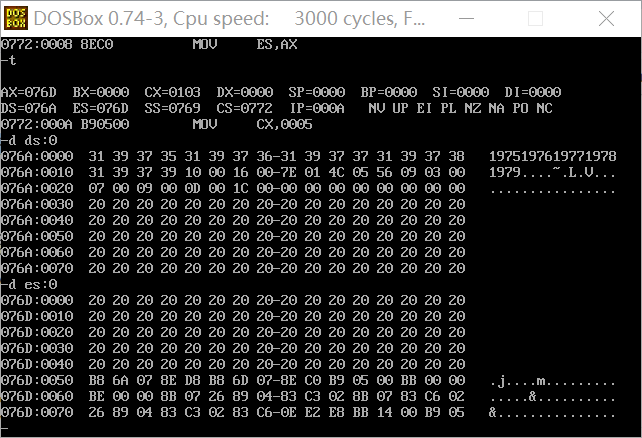
-
Run in debug until the program exits, use the d command to view the screenshot of the memory space corresponding to the table segment, and confirm whether the information is structurally written to the specified memory as required
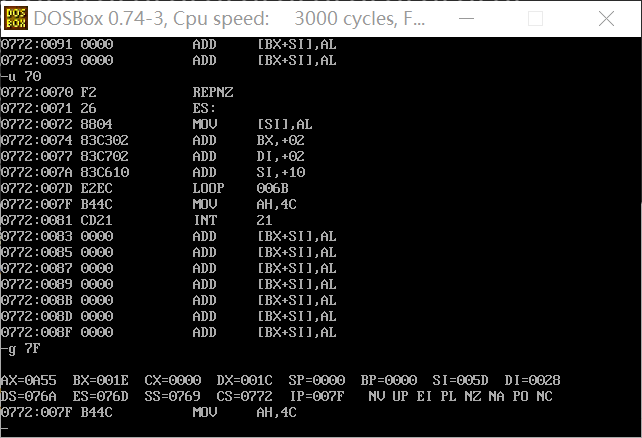
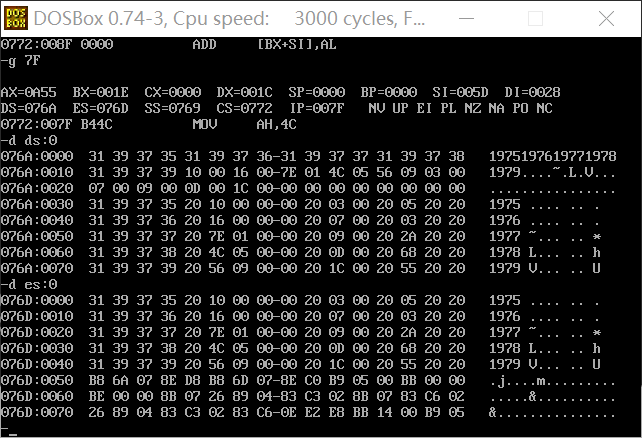
-